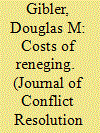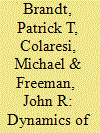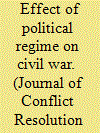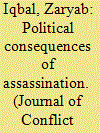|
|
|
Sort Order |
|
|
|
Items / Page
|
|
|
|
|
|
|
| Srl | Item |
| 1 |
ID:
082408


|
|
|
|
|
| Publication |
2008.
|
| Summary/Abstract |
This analysis examines ballistic missile proliferation in the context of strategic interactions among neighboring states. The analysis finds that when faced with ballistic missile threats, nations respond rationally and acquire ballistic missiles as a deterrent. Using a panel data set of 119 countries from 1967 to 1997, this study shows that the probability of a country procuring ballistic missiles increases nonlinearly as the number of bordering states with ballistic missiles increases. Although international norms arising from the Missile Technology Control Regime reduced the probability of missile proliferation, these externalities did not offset a state's decision to arm in response to ballistic missile arsenals in neighboring states. This analysis also finds that surface-to-air missiles (SAMs) increased the probability of proliferation in two ways: first, because ballistic missiles provided states ``ensured penetration'' of a rival's air defenses; and second, because SAMs reduced the ability of a rival to retaliate against a ballistic missile attack
|
|
|
|
|
|
|
|
|
|
|
|
|
|
|
|
| 2 |
ID:
082407


|
|
|
|
|
| Publication |
2008.
|
| Summary/Abstract |
Reputations are supposed to matter. Decision makers consistently refer to reputations for resolve, and international relations theories confirm the value of being able to credibly signal intentions during times of crisis. However, empirical support for the effects of reputation has been lacking. Problems of strategic selection have hampered previous quantitative tests, and the qualitative literature provides scant support for the concept in individual crises. In this article, the author shifts the focus from crisis behavior to alliance commitments and examines the effects that opportunities to uphold previous commitments have on future alliance commitments and conflicts. The results demonstrate that alliance reputations do affect both alliance formation and dispute behavior
|
|
|
|
|
|
|
|
|
|
|
|
|
|
|
|
| 3 |
ID:
082403


|
|
|
|
|
| Publication |
2008.
|
| Summary/Abstract |
Do public opinion dynamics play an important role in understanding conflict trajectories between democratic governments and other rival groups? The authors interpret several theories of opinion dynamics as competing clusters of contemporaneous causal links connoting reciprocity, accountability, and credibility. They translate these clusters into four distinct Bayesian structural time series models fit to events data from the Israeli-Palestinian conflict with variables for U.S. intervention and Jewish public opinion about prospects for peace. A credibility model, allowing Jewish public opinion to influence U.S., Palestinian, and Israeli behavior within a given month, fits best. More pacific Israeli opinion leads to more immediate Palestinian hostility toward Israelis. This response's direction suggests a negative feedback mechanism in which low-level conflict is maintained and momentum toward either all-out war or dramatic peace is slowed. In addition, a forecasting model including Jewish public opinion is shown to forecast ex ante better than a model without this variable
|
|
|
|
|
|
|
|
|
|
|
|
|
|
|
|
| 4 |
ID:
082406


|
|
|
|
|
| Publication |
2008.
|
| Summary/Abstract |
Research published in the American Political Science Review shows that anocracies-as defined by the middle of the Polity index of political regime-are more susceptible to civil war than are either pure democracies or pure dictatorships. Yet, certain components of the Polity index include a factional category, where political competition is ``intense, hostile, and frequently violent. Extreme factionalism may be manifested in the establishment of rival governments and in civil war'' (Gurr 1989, 12). Not surprisingly, these components exhibit a strong relationship with civil war. When they are removed from the Polity index, however, the original relationship disappears. I conclude that the original finding is not driven by the relationship between political institutions and civil war but rather by a less provocative relationship between political violence and civil war.
|
|
|
|
|
|
|
|
|
|
|
|
|
|
|
|
| 5 |
ID:
082404


|
|
|
|
|
| Publication |
2008.
|
| Summary/Abstract |
The present experiment introduces a modification of the iterated prisoner's dilemma (PD). In contrast to classical dilemma situations with only one interaction partner, participants (N = 120) interacted with five fictitious interaction partners within one game, either in a random order (change condition) or against each of the interaction partners in succession (block condition). The authors assume that the change condition simulates the social interactions of a real environment more accurately and that individual memory skills are more important in the change condition as compared to the block condition. As dependent variables, the participants' score in the game was recorded, as well as the participants' memory performance concerning information about their interaction partners. Results show that good memory performance with respect to biographical information leads to higher scores only in the condition with changing interaction partners, but not in the block condition
|
|
|
|
|
|
|
|
|
|
|
|
|
|
|
|
| 6 |
ID:
082405


|
|
|
|
|
| Publication |
2008.
|
| Summary/Abstract |
The assassination of a political leader is among the highest-profile acts of political violence, and conventional wisdom holds that such events often have substantial political, social, and economic effects on states. We investigate the extent to which the assassination of a head of state affects political stability through an analysis of all assassinations of heads of state between 1952 and 1997. We examine the political consequences of assassination by assessing the levels of political unrest, instability, and civil war in states that experience the assassination of their head of state. Our findings support the existence of an interactive relationship among assassination, leadership succession, and political turmoil: in particular, we find that assassinations' effects on political instability are greatest in systems in which the process of leadership succession is informal and unregulated
|
|
|
|
|
|
|
|
|
|
|
|
|
|
|
|
|
|
|
|
|